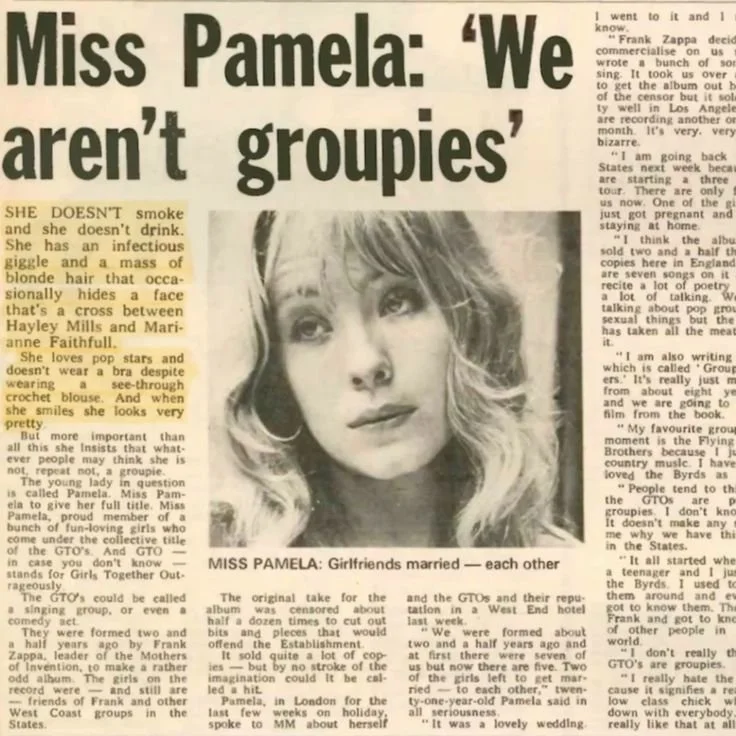Tiny Dancer
By Georgia Mills
There’s a moment in Almost Famous that I think about often, when Penny Lane, played by a baby Kate Hudson, turns to face the camera with a single tear rolling down her cheek. Her rockstar beau had discarded her moments ago — he traded her to another band for “$50 and a case of beer.” In a split second, she steels herself with a smile and wipes her tears away with a swipe of her thumb across her red cheeks before retorting: “what kind of beer?”
This is where Penny Lane diverges from the almost-famous figure behind her inspiration, Pamela des Barres. Miss Pamela was an iconic rock n’ roll groupie who famously slept with Mick Jagger, Jimmy Page, Jim Morrison, Noel Redding, Waylon Jennings, etc. Almost Famous director Cameron Crowe based the movie on his own preteen years, when he was writing about rock stars for Rolling Stone. He hung out with Led Zeppelin and observed a then-teenage Pamela (usually found sitting beside Robert Plant) navigating the very adult world of rock n roll. Thirty years later, Penny Lane danced across the silver screen.
Image Sourced through Pinterest
Crowe’s voyeurism irked Miss Pamela in real life, as she felt that, through Almost Famous, he told her story for her, without consulting her for her perspective. She griped that Penny Lane’s attachment to her rockstar beau (fictional guitarist Russell, played by Billy Crudup) was “pathetic” and inaccurate. In reality, Miss Pamela said, “there was always someone else coming to town.” Here, I believe that she’s referring to the movie’s penultimate scene, when Penny Lane watches wide eyed while Russell pretends not to know her in front of his wife, before she runs back to her hotel room and pops one too many quaaludes.
Crowe’s narrator William, a teen reporter for Rolling Stone himself, runs after her.
“Why doesn’t he love me,” she cries, while William closes her blue-shadowed eyes softly with the pads of his fingertips. He’s her one true friend: a boy who loves her with his whole fifteen-year old heart.
After calling the doctor, William stands back as Penny Lane’s stomach is pumped, watching through the bathroom door as she retches and convulses over the bathtub. A lustful smile spreads across his face as My Cherie Amour kicks in. Moments before, holding her drugged body up in a Weekend-at-Bernie’s style dance around the hotel room, William told Penny Lane that he loved her with the passion of a prom king, before stealing a passionate kiss while his queen’s limp head lolled back.
This, I believe, is what Miss Pamela took objection to. It’s also the heart of the movie.
I read I’m With the Band, Miss Pamela’s memoir, last summer by the pool. I doodled pink hearts beside my favourite lines and laughed out loud at the stories that read like my own diary entries, tales of sloppy desire and bawling rejection, a young woman living viciously for the moment.
With wine all over my dress, I write . . . so goes an entry in her diary. All dreaded thoughts have proven to come true.
. . . It can’t be purely sexual, there’s too much going on between us, but our attraction for each other is boundless. This stuff is definitely no good for the head.
Image Sourced through Pinterest
Miss Pamela sought after the desires of her affection (from her high school boyfriends to Burrito Boys) with a sort of cosmic fervour that runs on lustful confidence. In the privacy of her diary, she’s insecure and vulnerable and messy and yearning — to her leather clad rock stars, she’s effortlessly cool and magnetic, floating into the room with a sense of ease akin to Penny Lane’s. Being a groupie is like being a magician: it’s the ultimate magic trick.
My favourite moment in Penny Lane’s story is at the end of the movie. She sidles up to the ticket counter at the airport, sets her sunglasses down and says: “Morrocco, seat by the window please,” like a wink.
With this line, her past flashes before our eyes, while her future glimmers in the distance. She’s wise beyond her years, flirting with what’s to come. A tiny dancer, no longer with the band.


